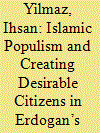| Srl | Item |
| 1 |
ID:
164572


|
|
|
|
|
| Summary/Abstract |
Turkey’s Justice and Development Party (AKP) governments have managed to remove Kemalism only to replace it with an Islamist nation-building and social-engineering project that is as, if not more, authoritarian, conservative, and regressive than the Kemalist one. The Turkish education system has been transformed into a political tool to manipulate youth and mold them into cadres of a peculiar Islamist ideology supported by the Recep Tayyip Erdogan regime. This essay discusses four sets of educational tools that have been redesigned to enable Erdogan and his entourage to shape the worldview of younger generations of Turkish citizens.
|
|
|
|
|
|
|
|
|
|
|
|
|
|
|
|
| 2 |
ID:
164569


|
|
|
|
|
| Summary/Abstract |
The issue of the constitutional name of the Former Yugoslav Republic of Macedonia, or FYROM, involves a question of identity that dates back at least to the early twentieth century. Athens and Skopje are seeking a mutually acceptable resolution not only for their own benefit but for the benefit of regional peace and stability. The relationship between the parties has passed through distinctive phases. The current phase seems to encompass a great amount of optimism and political realism from both sides. It remains to be seen whether this optimism will lead to a political result.
|
|
|
|
|
|
|
|
|
|
|
|
|
|
|
|
| 3 |
ID:
164570


|
|
|
|
|
| Summary/Abstract |
When the United States and its NATO allies helped insurgents overthrow Libyan dictator Muammar Gaddafi in 2011, the belief was that the intervention prevented a humanitarian catastrophe and that a post-Gaddafi Libya would be stable and democratic. Instead, Libya became a cauldron of chaos and human suffering. Rival, mostly Islamist militias vie for power in a multisided civil war. There is a vast flow of desperate refugees trying to get across the Mediterranean to Europe, many of whom perish in the attempt. Libya is a case study in how good intentions are not enough in foreign policy.
|
|
|
|
|
|
|
|
|
|
|
|
|
|
|
|
| 4 |
ID:
164571


|
|
|
|
|
| Summary/Abstract |
This essay attempts to elucidate the transformation of civil-military relations in Turkey since the failed coup of 15 July 2016. After presenting an overview of these relations prior to the coup, the essay focuses on emerging aspects of them in the postcoup environment and attempts to analyze a pattern. It argues that while a harsh domination has been established over the military by civilian politicians through massive efforts in structural, educational, and legislative domains, those efforts are far from being overarching. Whether it has produced a democratic form of civil-military relations and an irreversible transformation in the mindsets of officer corps is dubious.
|
|
|
|
|
|
|
|
|
|
|
|
|
|
|
|
| 5 |
ID:
164573


|
|
|
|
|
| Summary/Abstract |
Since 2013, Greece, along with the rest of Europe, has experienced a rapid increase in refugee flows. The sudden influx of refugees has had a negative impact on the perception of Greek society regarding their potential threat. According to a 2016 survey, 55 percent of Greeks believe that the influx of refugee flows can increase the likelihood of terrorist attacks. Furthermore, 65 percent of Greeks have a negative review of Muslims. Because Greece has not been the victim of Muslim terrorist attacks and historically has had strong ties with the Arab world, these perceptions represent a puzzle. Adopting a qualitative methodological approach, this essay analyzes the causes of negative Greek attitudes toward refugees. It finds that the negative perceptions among Greek society stem from two factors: the perceived negative economic impact and the perceived cultural impact of refugees.
|
|
|
|
|
|
|
|
|
|
|
|
|
|
|
|